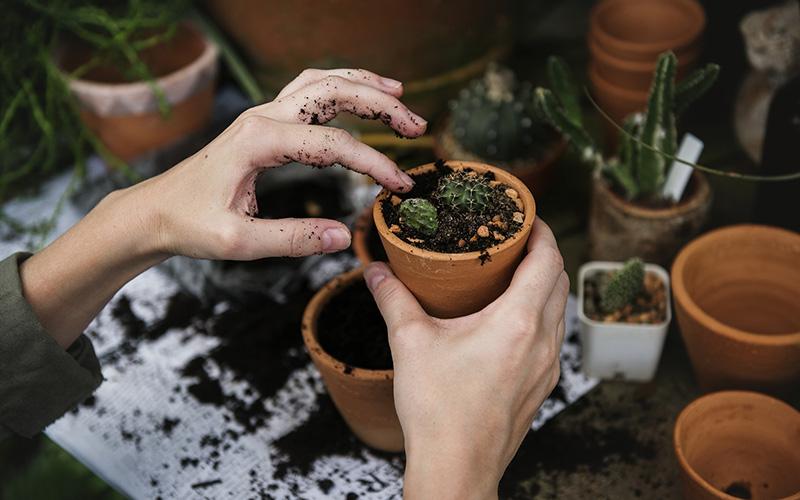
Kubota reveals gardening impact on mental health
BALI Registered Affiliate member Kubota reveals the most therapeutic elements of gardening and the impact it has on our mental health and wellbeing
Key findings:
The garden is an important place for relaxation, with around two thirds (83%) of those surveyed revealing their garden is a place to unwind
Having a garden helps us spend more time in the great outdoors, with over three quarters (78%) of us spending more time outside due to having a garden
Over half of Britons (64%) garden for their own personal pleasure and satisfaction
LONDON: Today, gardening equipment manufacturer Kubota reveals why we are taking to gardening, with statistics showing that over two thirds of Brits (83%) claim that the garden is the perfect place to relax. The results have been released to coincide with National Gardening Week (29th April - 5th May).
Kubota, a market-leading manufacturer of groundcare, equipment, has done a bit of digging to delve into the effects that the garden can have on our mood and to discover if we are turning to the great outdoors for much needed stress relief or if it’s really about impressing the neighbors with a pristine lawn...
Are we a nation of devoted gardeners?
With the average Brit spending 90% of their day indoors[1], most of us are missing out on the benefits of getting outdoors, not just on our physical health but our mental health too. Having access to a garden can make a huge impact on how much time we spend outdoors, taking in much needed fresh air and enjoying the sights and sounds of nature. The research undertaken by Kubota reveals that over three quarters (78%) of those surveyed find that having a garden makes them spend more time outside than they would otherwise. Busy work commitments and long commutes in today’s modern world could be some of the offending factors preventing us from spending less time outdoors than we’d like.
And for those lucky enough to have their own garden, the research has revealed that they are spending between 1-10 hours tending to their gardens every month. Men have been revealed as the most passionate gardeners, with over a third (38%) of men spending six hours or more in the garden a month, in comparison to 30% of women.
Is gardening a hobby or a chore?
When it comes to what motivates Brits to tend to their gardens, it’s interesting to look at the main reasons as to why we’re getting stuck into the soil. It would appear that our own wellbeing is an important factor as to why we like to keep our gardens looking their best, with nearly two thirds (64%) being motivated by their own personal pleasure and satisfaction to tend to their garden and nearly a quarter (24%) claiming gardening to be a hobby rather than a chore.
But there is an element of ‘keeping up with the Jones’’. 8% of those in the poll revealed that they only tend to their gardens because they’re worried about other people’s opinions of it and a further 5% admitted to only planting and sowing to impress their neighbours!
What are the benefits of gardening on mental health?
It is estimated that in the UK alone, a third of 16-24 year olds experience a mental health condition[2]. The research undertaken by Kubota reveals that 40% of young people find that gardening can help them to feel calm, with a further 34% agreeing it has a positive effect on their mood.
It’s important for young people to realise the benefits of gardening on mental health. With the younger generation of 16-24 year olds not spending as much time in the garden as their peers with only 3 and a half hours a month in comparison to nearly 7 hours in the over 55+s, horticultural therapy could be an excellent way for young people to relax, it is clear that they could be benefiting from spending more time in the garden to improve their mental wellbeing.
The sights, the smells and the sounds of the Great British Garden
It is commonly thought that the sights, smells, and sounds of the garden are all said to endorse relaxation and reduce stress. And when it comes to the senses of the garden, it would appear that we’re most impacted by what we see. Choosing flowers in particular, half of Brits opt for certain flowers down to the overall look of them, closely followed by the colour (46%) and the aroma they give off (30%). More generally in the garden, it’s all about the aesthetics with nearly half (43%) saying the look of their garden is the most important sense, followed by sounds they hear (29%).
The research also indicated that water features might be a declining trend in the garden. Although commonly thought of as a calming, relaxing sound, the sound of water was not something which rated highly with respondents, with only 12% of garden owners saying that having a water feature would make them feel relaxed and something that they would like to introduce to their garden.
Jane Shaw, psychologist, M.A. in Jungian and archetypal psychology comments: “Listening to birdsong in our gardens helps our body and mind to relax. As humans we are hard-wired to feel safe if we can hear birds singing, with resulting lower anxiety and stress levels. The more we develop the neural pathways of listening by orienting to birdsong the more our mind and bodies are able to let go of their tensions and strains.
Furthermore by tending to plants and flowers, whether with our hands or simply enjoying their scent and aesthetic, chemicals are released in our brain making us feel not only less stressed but also giving us a sense of connection and contentment”.
Kubota are well known for their range of groundcare machinery including mowers and utility vehicles which are built for premium efficiency, comfort and versatility. For more information, visit https://www.kubota-eu.com/en/gc

